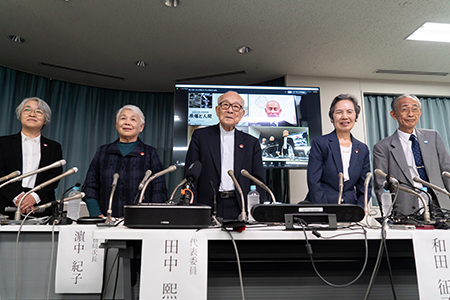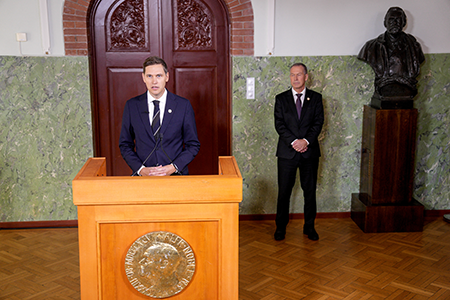Japanese A-Bomb Survivors Group Wins Nobel Peace Prize
November 2024
By Shizuka Kuramitsu
The Japan Confederation of A- and H-Bomb Sufferers Organizations, also known as Nihon Hidankyo, was awarded the 2024 Nobel Peace Prize for its work reminding people of the horror of nuclear weapons and strengthening the taboo against nuclear use.

Sending a clear pro-disarmament message with its decision, the Norwegian Nobel Committee declared in a press release on Oct. 11 that “[t]he extraordinary efforts of Nihon Hidankyo and other representatives of the Hibakusha have contributed greatly to the establishment of the nuclear taboo. It is therefore alarming that today this taboo against the use of nuclear weapons is under pressure.”
The hibakusha, as the survivors of the atomic and hydrogen bombings of Hiroshima and Nagasaki in 1945 and of subsequent nuclear tests are known, “have helped to generate and consolidate widespread opposition to nuclear weapons around the world by drawing on personal stories, creating educational campaigns based on their own experience, and issuing urgent warnings against the spread and use of nuclear weapons,” the Nobel committee added.
Nihon Hidankyo, a national organization comprised of member chapters in 36 of Japan’s prefectures, was established in August 1956 in response to the campaign against nuclear weapons and the 1954 U.S. hydrogen bomb test in Bikini Atoll.
“We pledge our determination to save ourselves and, through our experiences, to save humanity from crisis,” according to the organization’s founding declaration.
Nihon Hidankyo’s main missions have been to ask Japan for compensation for the negative effects that survivors suffered from the atomic bombings and to lobby for a world without nuclear weapons so that no one will ever suffer what they have gone through.
As of March, the average age of the hibakusha was more than 85 years, according to a study by the Japanese Ministry of Health, Labor and Welfare. Because of the shrinking size of the organization and its funding base, Nihon Hidankyo chapters “do not know how long they will be able to continue their activities,” said Jiro Hamasumi, the organization’s assistant director-general at a press conference on Oct. 12.
“We have not yet fulfilled our role until these goals are met. Despite difficulties, we will continue to do our best,” Hamasumi added.

When the prize was announced, disarmament communities and leaders around the world congratulated and thanked Nihon Hidankyo for its tireless work and renewed their commitment to advance disarmament amid rising nuclear threats.
“Reducing the nuclear threat is important, not despite the dangers of today’s world but precisely because of them,” U.S. President Joe Biden said in a statement on Oct. 13. “These nuclear risks erode the norms and agreements we have worked collectively to put in place and run counter to the vital work of today’s Nobel Laureates.”
Jørgen Watne Frydnes, chair of the Norwegian Nobel Committee, said, “One day, the hibakusha will no longer be among us as witnesses to history, but with a strong culture of remembrance and continued commitment, new generations in Japan are carrying forward the experience and the message of the witnesses.”
“They are inspiring and educating people around the world. In this way, they are helping to maintain the nuclear taboo—a precondition of a peaceful future for humanity,” he said.
Nihon Hidankyo was nominated for the Nobel Peace Prize several times in the past, according to Jiji press. The award ceremony will take place in Oslo on Dec. 10.
Nobel Peace Prize The Nobel Peace Prize has been awarded 105 times to 142 Nobel laureates (111 individuals and 31 organizations) between 1901 and 2024. This is the seventh time since 1985 that the Norwegian Nobel Committee has recognized organizations and individuals for their disarmament work. Past winners in that category are: International Campaign to Abolish Nuclear Weapons, “for its work to draw attention to the catastrophic humanitarian consequences of any use of nuclear weapons and for its ground-breaking efforts to achieve a treaty-based prohibition of such weapons” (2017); Organisation for the Prohibition of Chemical Weapons, “for its extensive efforts to eliminate chemical weapons” (2013); International Atomic Energy Agency and Mohamed ElBaradei, “for their efforts to prevent nuclear energy from being used for military purposes and to ensure that nuclear energy for peaceful purposes is used in the safest possible way” (2005); International Campaign to Ban Landmines and Jody Williams, “for their work for the banning and clearing of anti-personnel mines” (1997); Joseph Rotblat and Pugwash Conferences on Science and World Affairs, “for their efforts to diminish the part played by nuclear arms in international politics and, in the longer run, to eliminate such arms” (1995); and International Physicians for the Prevention of Nuclear War, “for service to mankind by spreading authoritative information and by creating an awareness of the catastrophic consequences of atomic warfare” (1985). |
